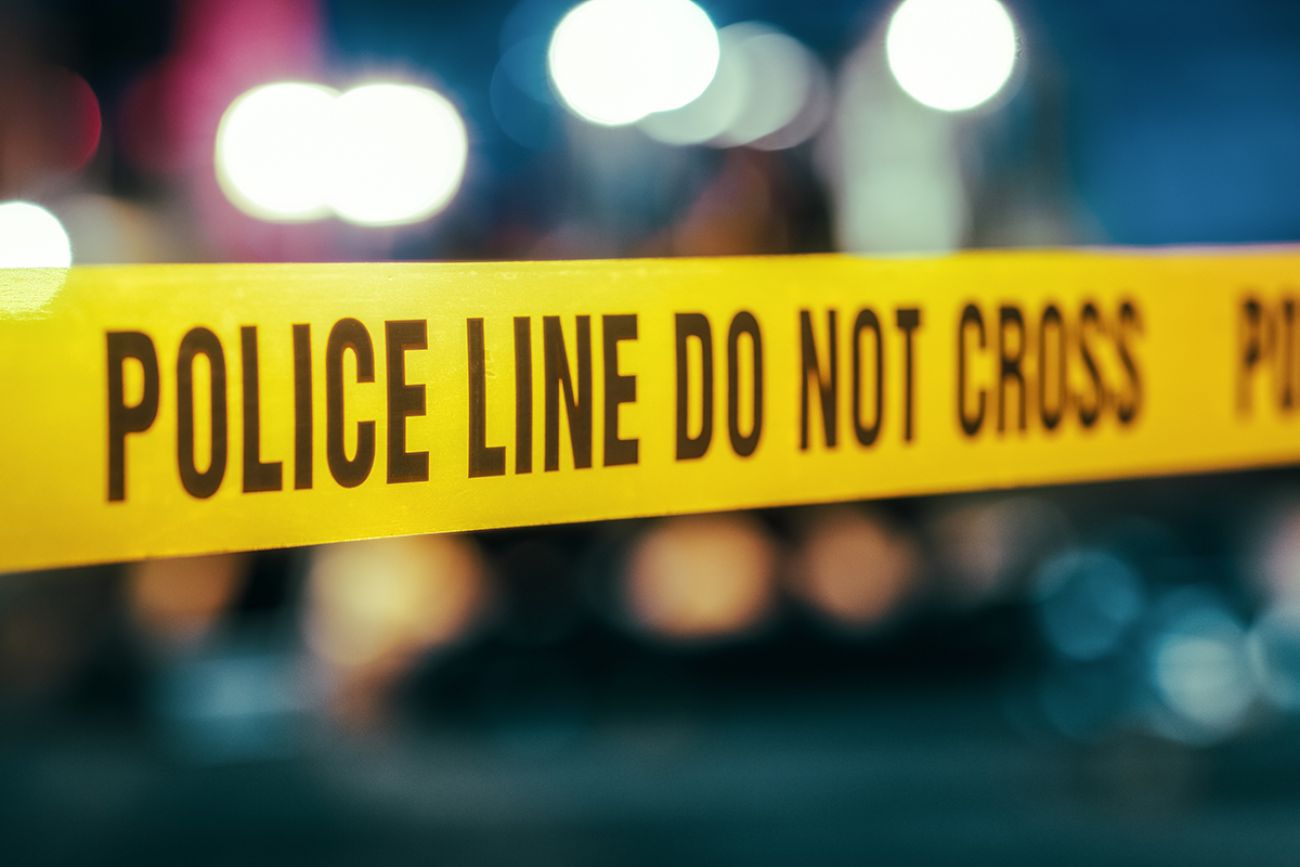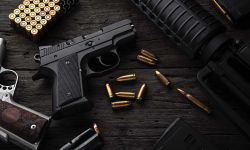Michigan splash pad shooter was a known risk. 'Red flag' law didn't stop him


- Police say Michigan splash pad shooter had a dozen guns and signs of mental illness but was not previously reported to authorities
- While Michigan ‘red flag’ orders can remove guns from people at risk of hurting themselves or others, police warn they aren’t a panacea
- Shooting left nine injured, but none ‘in immediate peril of passing’
LANSING — A Shelby Township man who opened fire on an Oakland County splash pad was so worried the government was tracking him that he carried a gun in his own home — but still legally possessed the gun he used to wound nine people.
A law that went into effect this year in Michigan is designed to allow judges to confiscate weapons from people like Michael William Nash, 42, who police say had 11 more guns at the home he shared with his mother.
But gun laws failed to stop the Saturday shooting for one simple reason: Nobody asked a court or law enforcement to intervene.
The limits of the law came into sharper focus on Monday as more details emerged about the shooter. Oakland County Sheriff Michael Bouchard told reporters that the man’s mental health struggles were well-known among relatives.
Related:
- Michigan splash pad shooting: What we know, and what to expect next
- Police are using Michigan’s ‘red flag’ law to confiscate guns. Here’s how
- Whitmer signs ‘red flag’ law, allowing Michigan judges to confiscate guns
“It appears he had been musing about different things, saying, ‘shut your phone off. We're being watched. They are listening to us.’ Walking around the house with weapons,” Oakland County Sheriff Michael Bouchard said Monday.
Prior to Saturday’s shooting, Michigan's new “red flag” law has so far been used roughly 100 times for court orders to confiscate guns from individuals who pose an immediate risk to themselves or others.
Michigan Democrats who took control of the state Legislature last year have passed a series of gun reforms aimed at curbing firearm violence, including new safe storage and universal background check legislation.
Under the red flag law, which took effect in February, a judge can only issue an extreme risk protection order after an individual petitions a court and shows why immediate harm could occur.
Those who can petition include members of law enforcement, health care professionals, and members of a person’s immediate family or people who reside in the same household as them.
That does not include neighbors, who described the splash pad shooter as a "loner" who kept to himself.
Keeping the list of who may file risk protection orders “relatively narrow,” is important so as to not overwhelm police or courts, Sen. Mallory McMorrow told Bridge Michigan in a Monday text.
The Royal Oak Democrat, integral in helping pass risk protection orders into state law in 2023, said while she understood families might be reluctant to pursue these orders against loved ones, “it’s a tool to help them save their loved one’s life, not arrest them.”
“I understand people may not want to put their loved one in a situation of ‘reporting them’,” McMorrow said, “but it’s important to stress (an extreme risk protection order) acknowledges that the individual has done nothing wrong but that the presence of a firearm, given a mental health crisis, can be deadly.”
Bouchard, who said his agency has used current law to confiscate guns from individuals suffering a mental health crisis, told reporters that the shooter’s mother has obtained a lawyer since initially talking to police.
"There'll be a lot of people talking about the solutions," Bouchard said. "That's the solution that we see from public safety: Someone sees something, someone hears something, and we don't connect those dots.”
'No panacea'
Police had still not established a motive for the splash pad shooting as of Monday. The shooter had no prior history with police and fatally shot himself Saturday following the earlier shooting, authorities said.
But he showed signs of paranoia, said Bouchard, telling reporters the shooter believed he was being spied upon by the government and went so far as to carry a handgun inside his home for apparent protection.
“It appears to me, as a layperson, he’s had some mental health things going on,” Bouchard said, “and at this point we still have no information that was brought to anyone’s attention.”
Police suspect the shooter fired at least three dozen times at the splash pad using a semi-automatic handgun. They believe he carried a second gun that he later used to kill himself at his home in Shelby Township, where authorities found other weapons, including an “AR platform” rifle on his kitchen table.
The handgun used in the shooting was purchased legally in 2015, Bouchard said, noting police are still doing checks on the other weapons they found.
“You can own firearms if you have no criminal history and no evidence of mental health (issues),” he added.
While poor mental health alone does not mean an extreme risk protection order should be issued — it could have made the shooter a candidate.
But law enforcement are skeptical it would have made any difference in Saturday’s shooting, cautioning against viewing the orders as a silver bullet.
“I don’t want people to be under the mistaken impression that an extreme risk protection order is a panacea,” Dan Pfannes, deputy director of the Michigan Sheriffs’ Association told Bridge Michigan earlier this month.
“It's one tool amongst the many to potentially resolve a problem.”
100 red flags
Pfannes, who has followed usage of the extreme risk protection process since February, said approximately 100 orders have been issued statewide since June 4.
The bulk of those, about 75% he estimated, were law enforcement initiated.
And while Pfannes said the process appears to be working as legislatively intended, the gun confiscation orders should not be viewed as the solution in cases where “the true need is a mental health pickup order,” he said.
While risk protection orders do preclude a person from possessing, purchasing or obtaining a gun throughout their duration, Pfannes noted it “doesn’t necessarily address the mental health concerns” that might have contributed to seeking an order in the first place.
Extreme risk protection orders are only issued after an individual petitions the court for one and shows why immediate harm could occur.
In the case of the splash pad shooter, who had no prior criminal record, it’s unclear if a judge would have granted a confiscation order solely on the grounds of him struggling with his mental health.
Of the six risk protection orders filed as of May 6 in Macomb County — where the splash pad shooter resided — none were associated with the Shelby Township resident, per a Bridge Michigan review.
A Bridge request for any further risk orders granted or denied after that May 6 date, should they exist, is currently under review by the county clerk’s office.
Investigative update
None of Saturday’s nine victims are “in immediate peril of passing,” Bouchard said during Monday’s status update. Some have already been released from the hospital.
Police have yet to find a note or manifesto explaining the shooter’s actions but did seize from his home a phone, tablet, Macbook Pro, two computer towers, two USB drives and two external hard drives. They also seized more than a dozen guns from the home, including multiple rifles and a bolt-action shotgun.
A review of the shooter’s electronic devices is ongoing, Bouchard said, noting authorities were able to access his phone and found “nothing of interest or corroborative information as it relates to the motive.”
As those efforts continue, Bouchard stressed a need for “more focus on mental health for the community, more mental health resources and a wider continuum of care — both inpatient and outpatient,” as currently, “it's not there.”
He also stressed the importance of situational awareness, such as knowing possible exits for a building in case of an emergency.
While nobody wants to consider the possibility of encountering an active shooter, let alone needing to run from one, Bouchard likened the scenario to buying homeowners insurance: Have a plan in the off-chance something bad happens, knowing you’ll be covered if it does.
“I hate to say that,” he added, “but that’s the world in which we live.”
See what new members are saying about why they donated to Bridge Michigan:
- “In order for this information to be accurate and unbiased it must be underwritten by its readers, not by special interests.” - Larry S.
- “Not many other media sources report on the topics Bridge does.” - Susan B.
- “Your journalism is outstanding and rare these days.” - Mark S.
If you want to ensure the future of nonpartisan, nonprofit Michigan journalism, please become a member today. You, too, will be asked why you donated and maybe we'll feature your quote next time!


